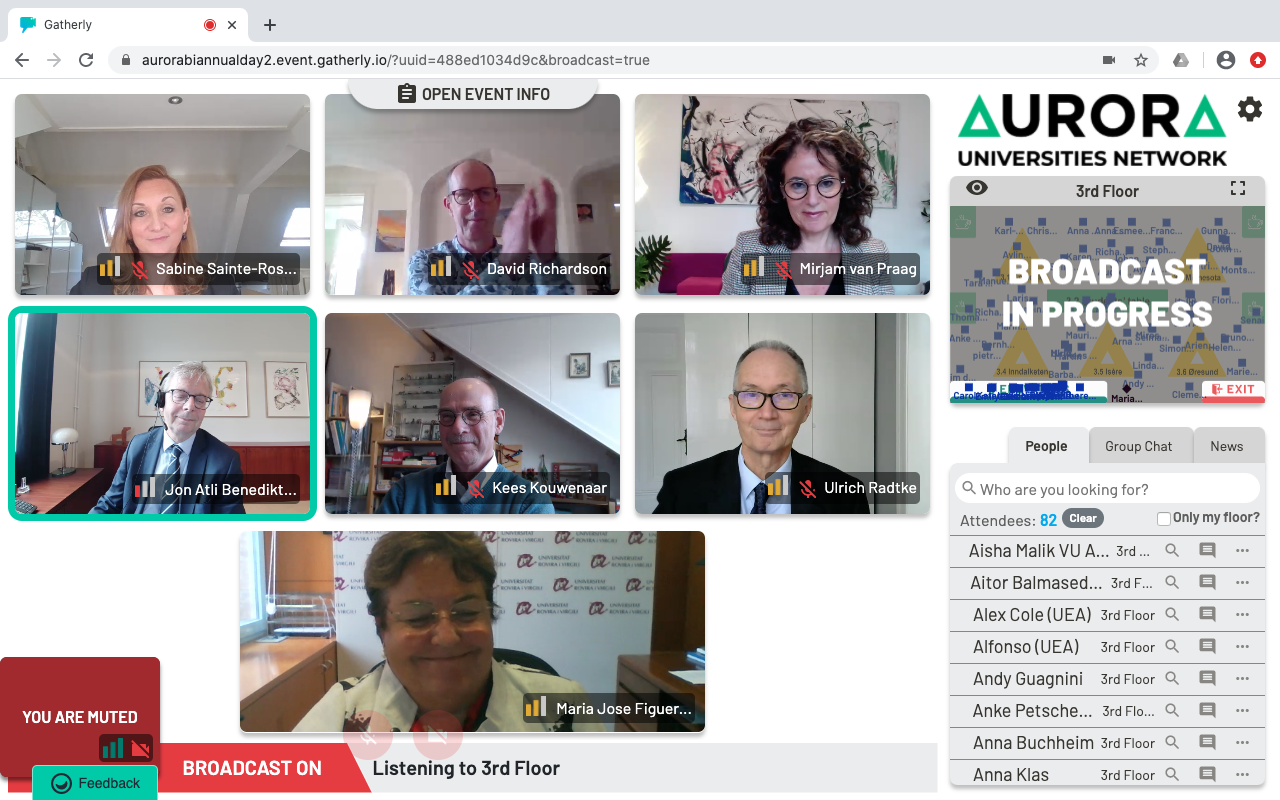
On November 4th and 5th 2020, the eighth Aurora biannual was organized using an online social video conference platform called Gatherly. A total of 264 participants connected remotely during the two-day biannual to take part in the 27 Aurora parallel sessions, two plenaries and a reception.
The two biannual plenaries – one for the Aurora Universities Network plenary and one for the Aurora European University Alliance, were well attended with over 80 participants listening in to various presentations. David Richardson – stepping down as Aurora president during the Biannual – opened the network plenary. Guest speakers Ann-Sofie van Enis and Tim Strasser from SOS International presented the Green Office movement model and the Green Impact model. Afterwards, Maurice Vanderfeesten shared progress on the SDG Bibliometrics tool.
The Alliance plenary was opened by Mirjam van Praag, president of VU Amsterdam and of the Aurora Alliance Board; with all presidents of alliance university members sharing their pride in being part of the alliance. To quote some of them:
Tilmann Märk – The University of Innsbruck: “We are together on a journey to become a more united group of universities, with an own identity and own culture. We’ve had challenging weeks and months. Times are changing but here within this project we are luckily in the driver seat to steer the change we want to see. And so, therefore, we can build on our individual strength and the excellent working plan we have put up together.”
Ulrich Radtke – University Duisburg-Essen “Aurora Alliance is a network of excellence and trust. It is very important for me, and it’s a joy to work together in Aurora, and the University of Duisburg-Essen is proud of being part of the Aurora European University Alliance”
David Richardson – University of East Anglia “I think we have a real opportunity to go together as a university alliance in how to co-develop our curricula in ways which can become more inclusive, more representative, and more reflective of the global issues. Our students must understand and are educated in sustainability and the United Nations Sustainable Development Goals. So they become future leaders for us. In our alliance, we have 350.000 students who are in the most entrepreneurial, enterprising, creative, innovative, and actually risk-taking stages in their lives. We have a real opportunity to grasp that as an alliance by taking forward and prepare people who can make a real difference to the world when they graduate from our alliance and go on to pursue their lives across the globe.”
Copenhagen Business School message was given by Mirjam van Praag: “For Copenhagen Business School, the Aurora project is a great opportunity to form international partnerships and network across countries. It is particularly positive that the EUN partnership addresses the scientific field of societal impact and social entrepreneurship and innovation. These core aspects mirror important priorities in CBS’s new strategy. So to put it mildly, we are very happy to join the project.”
After the impactful speeches by the alliance presidents, Bernhard Fugenshuh inspired us on how universities can equip graduates with the right skill set and mindset. Aurora Student President Callum Perry from the University of East Anglia presented his vision for Aurora and launched the Aurora Student Championship to the Aurora community.
During the biannual, it was also announced that David Richardson’s term ended as president of Aurora universities Network. We thank Mr Richardson for his continuous efforts of being part of the network and being the driving force behind Aurora. Without his profound vision of creating a network of united universities who are not only societally engaged but also excel in academics, Aurora would not have been where it is now. Jon Atli Benediktsson, the rector of the University of Iceland, succeeds Mr Richardson and will be the president for the coming two years.
Aurora also hosted a reception where all could raise the glass while listening to the musical interlude prepared by the University of East Anglia choir. Enjoy the interlude here. Aurora invited Simon Anholt to speak about his book The Good Country Equation and share key observations about a university’s role in society. Since many participants were keen on reading Mr Anholts book, his publishers, Berrett-Koehler, have offered a 30% discount on the digital editions (e-book and Audiobook) of The Good Country Equation to attendees of the conference and the wider Aurora network.
During the Biannual, a total of 27 separate working groups met during the five time slots for parallel sessions. Among these were the vice-rectors education, the Aurora Student Council, the Alliance teams for Health & Well-being, for Social Entrepreneurship, as well as the coordinating teams for Learning for Societal Impact, Engaging Communities, and Sustainability Pioneers.
About us
Aurora is a partnership of like-minded and closely collaborating research‑intensive European universities, who use their academic excellence to drive societal change.

Co-funded by the Erasmus+ Programme of the European Union

This project has received funding from the European Union´s Horizon 2020 research and innovation programme under grant agreement No 101035804
© Aurora European Universities | map by Leaflet, © OpenStreetMap contributors, © CARTO | admin | email template.
